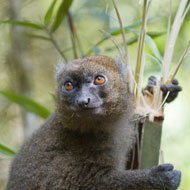
Longer dry season impacts greater bamboo’s survival
The critically endangered greater bamboo lemur is being pushed to the brink of extinction, as a result of human interference in Madagascar’s tropical rainforests, according to new research in Current Biology.
International scientists say climate change will force the species to eat culm - the woody trunk of the bamboo - for longer periods throughout the year. Their research suggests this is already impacting the species' lifespan and ability to thrive and reproduce.
The team, led by Patricia Chapple Wright of Stony Brook University, spent 18 months studying the species in its natural habitat - Madagascar’s Ranomafana National Park.
Greater bamboo lemurs spend 95 per cent of their feeding time eating a single species of woody bamboo. Their highly complex and specialised teeth allow them to consume and survive on woody culm from August to November, when tender shoots are unavailable due to the dry conditions.
However, wildfires, burning and timber exploitation have all led to reduced rainfall and a longer dry season. Over the past two years, researchers say there has been a three month delay in the rainy season, so new tender shoots are appearing in January and February. With new offspring being born in November, this delay is resulting in a dangerous lack of nutrition for babies and their mothers.
The research also predicted that the island’s dry season will continue to lengthen, exacerbating this problem.
“Thirty years ago these new shoots would come in December; now they don’t start until February,” Professor Wright explained. “These challenges can translate to decreased life span, increased tooth wear, and decreased birth rate.
“All of this adds to the lemur’s already serious predicament: their population is in the hundreds and they’ve already suffered decades of poaching and habitat destruction due to human encroachment.”
Once the most broadly distributed lemur in existence, greater bamboos are now one of the most critically endangered lemur species, with only around 800 left in the wild.
Prof Wright and her team at Stony Brook have started a project to reforest and re-bamboo parts of the island. They will also plant ‘bamboo corridors’ to connect the lemur’s isolated populations and expand their habitat, which has been cut up due to deforestation.
“The most important thing we can do in this case is to stop the burning of the forests and also of the denuded areas,” Prof Wright added. “Using the approach presented in the study, we are able to identify locations where this species may be viable if they are also protected from habitat loss and hunting.”



 The Veterinary Medicines Directorate (VMD) is inviting applications from veterinary students to attend a one-week extramural studies (EMS) placement in July 2026.
The Veterinary Medicines Directorate (VMD) is inviting applications from veterinary students to attend a one-week extramural studies (EMS) placement in July 2026.